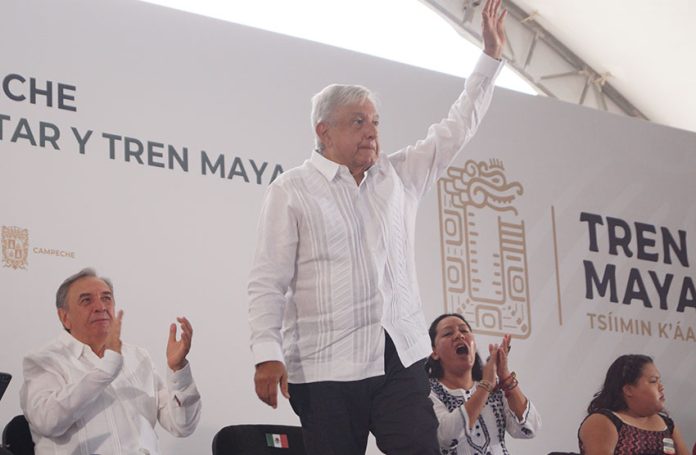Mexico is grinding to a halt. As lockdown restrictions sweep the nation, schools, offices and sports games are choosing to either close, restrict or postpone; the emergency brake has been pulled and the wheels of the economy are finally beginning to slow.
Despite a near universal acceptance of this, certain projects are proving too valuable to be shelved, and as if using the peace and quiet to get themselves a head start, seeming more proactive than ever, the Maya Train is going full steam ahead.
While it was never likely that this flagship project would be postponed in the same way as other arguably less important initiatives to the administration, it had always seemed that, with the slowing infrastructural powerhouse across the country, the masterminds of the train’s construction would resist the temptation to plough on through.
As it happens, the pressures of national lockdown seem only to have exacerbated a restlessness to complete the train as quickly as possible, with two contracts having been awarded to begin construction. Far and away from coronavirus raising the difficult questions of deadline shifts, economic impacts, and lack of manpower, it actually appears to be accelerating the decision making process.
Two weeks ago, a consortium led by Mota-Engil of Portugal was offered a contract worth 15.5 billion pesos to begin work on the initial portion of the train. A week later, another consortium of companies, owned and managed by Mexican billionaire Carlos Slim, was offered the contract for the second phase of the project.

The awarding of these contracts is not surprising in and of itself, but plans to begin work on construction are still set for May, despite the pandemic. Fonatur also announced this week that provided the project receives the green light from the Ministry of Health, the first ground could be broken as early as May 12.
This unprecedented determination to continue looks likely to rattle a few political feathers, the contracts having been awarded just days after a recommendation from five state governors and 2,000 business people that development of the Maya Train and the Dos Bocas refinery be scrapped. Their statement suggests that the funds for the project would be better spent on a combination of economic stimulation initiatives, financial relief for businesses, and funding for healthcare in areas of severe crisis.
This school of thought is popular with groups already opposed to the construction of the Maya Train, but increasingly so with the rest of the population who both recognize the potential fallout of the virus, and who also struggle to understand the benefit of unifying a decomposing tourist industry.
The governor of Nuevo León spoke to this issue, claiming that “thousands of jobs will be lost that will not be recovered with the construction of the Maya Train, thousands of companies and businesses are at risk.” It’s a worry now felt across the country. The Maya Train is facing an existential threat, not primarily from lack of resources or political will, but from the growing criticism that its fundamental concept no longer makes sense.
If there was one message from the governors and business people it was one that attempted to orientate priorities — where could this money be better spent? Those that are asking this question are emboldening the movement made up of environmental and indigenous land rights activists that already stand firmly against the project and have had their issues left unresolved. It seems possible that before long the opposition will summon the kind of cross-cultural, bipartisan support capable of toppling the Maya Train project.
No wonder then, that the government is keen to get work going; the longer it hesitates, the louder these voices become. This pressure could arguably be part of the reason why certain groups protesting the Maya Train have been denied access to submit appeals over the course of the last month. Reports this week show how district courts of the federal judicial branch based in Campeche and Yucatán, respectively, have impeded those set to be affected by construction from accessing justice.
Specifically, the Tres Colonias de Campeche Collective, made up of residents of the Camino Real, La Ermita and Santa Lucía neighborhoods in Campeche, were turned away in their attempt to present the court with an injunction. The injunction in question would delay the date at which their eviction from houses on development land would be enforced; on this occasion, they were reportedly told that it was not an “urgent matter.”
On another, members of the Maya Assembly Muuch Ximbal attempted to file an injunction against the project claiming that construction work during quarantine risked contamination and public health. This was, after much insistence, accepted by the district court but not considered a priority with the processing postponed until “after the public health emergency had passed;” the irony that it was precisely the health emergency that had prompted the injunction was apparently lost on the officials.
There seems to be more protest against the Maya Train project now than ever but equally, political determination to keep the wheels in motion is reaching all-time highs. If ground can be broken on the tourist train, there is some reason to believe that the project could be seen through to completion, but as long as dissenting voices are muted, it becomes all the more likely that they will find alternative ways to be heard.
Those who have been most hard done by in this saga so far have demonstrably made it their mission to be the thorn in the government’s side. In the meantime, and regardless of the efficacy of protest, as the pandemic continues to disrupt Mexican society protagonists of the project will need to ask themselves one simple question. For a region in flux, does the Maya Train still make sense?
Jack Gooderidge writes from Campeche.
